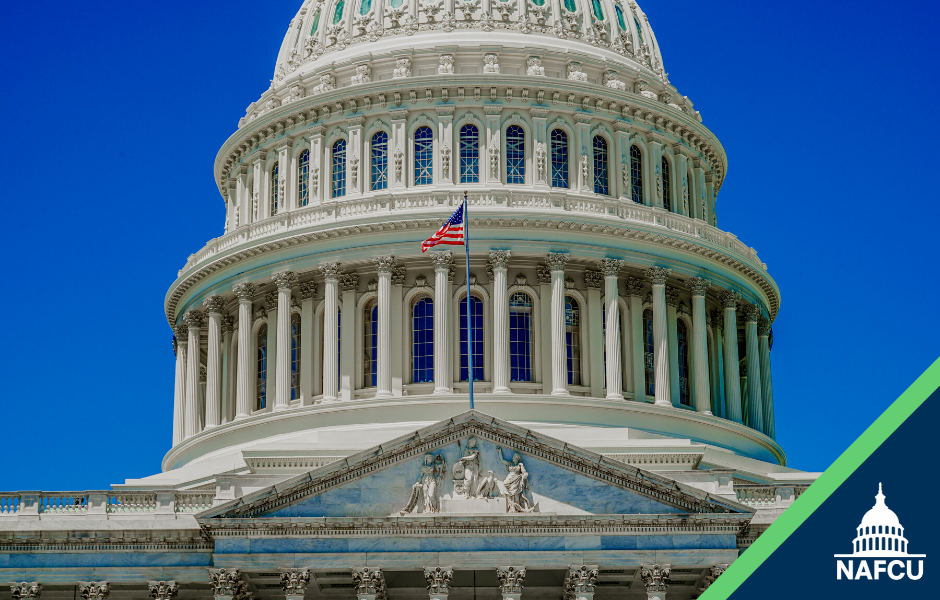Newsroom
NAFCU warns Senate Small Biz Committee about consequences of SBA’s changes to 7(a) loan program
 NAFCU Vice President of Legislative Affairs Brad Thaler wrote to the Senate Small Business Committee Tuesday ahead of its Small Business Administration (SBA) oversight hearing today, detailing concerns about the administration’s final rules to expand its lending networks.
NAFCU Vice President of Legislative Affairs Brad Thaler wrote to the Senate Small Business Committee Tuesday ahead of its Small Business Administration (SBA) oversight hearing today, detailing concerns about the administration’s final rules to expand its lending networks.
“As champions of financial inclusion, credit unions have been at the forefront of efforts to increase access to personal and small business financial services for underserved communities,” wrote Thaler. “At the same time, NAFCU has worked tirelessly to ensure that non-depository financial institutions such as fintechs operate on a level playing field with credit unions to protect consumers and small businesses by instituting appropriate financial safeguards and compliance processes.
“Unfortunately, we are concerned that two recent actions by the SBA may end up running counter to both of these efforts by opening the programs to more underregulated competition,” he added.
The SBA in April issued two final rules: the first to change regulations governing its 7(a) and 504 loan programs related to lending criteria, loan conditions, affiliation standards, and more, and the second to amend its loan program regulations to lift the moratorium on licensing new small business lending companies (SBLCs) and add a new type of entity, called a “Community Advantage SBLC.”
“While these are two separate rules, they would have the combined effect of loosening 7(a) lending standards at the same time as opening that program to entities already proven to be more susceptible to fraud than traditional depository institutions overseen by federal prudential regulators,” wrote Thaler.
Though NAFCU offered support for provisions of the proposed rule that would reduce costs and burdens on credit union SBA lenders, the association raised concerns about loosening guardrails for non-depository lenders that lack a prudential regulator – potentially increasing risks to the loan programs and creating an uneven playing field between credit unions and fintechs.
NAFCU previously asked the agency to pause both rulemakings to allow for a better understanding of the rules' separate and collective impacts. The SBA responded to these concerns by noting that SBA Supervised Lenders such as SBLCs that do not make non-SBA guaranteed commercial loans will need to submit their credit policies, including credit scoring models, for review by SBA prior to approval to participate in the program.
Of note, the House Small Business Committee wrote to the SBA Office of Capital Access to raise concerns over the administrations changes to the 7(a) lending program.
NAFCU will monitor today’s hearing and continue to advocate to ensure the safety and soundness of credit unions’ ability to provide access to capital for Main Street small businesses.
Share This
Related Resources
Add to Calendar 2024-06-26 14:00:00 2024-06-26 14:00:00 Gallagher Executive Compensation and Benefits Survey About the Webinar The webinar will share trends in executive pay increases, annual bonuses, and nonqualified benefit plans. Learn how to use the data charts as well as make this data actionable in order to improve your retention strategy. You’ll hear directly from the survey project manager on how to maximize the data points to gain a competitive edge in the market. Key findings on: Total compensation by asset size Nonqualified benefit plans Bonus targets and metrics Prerequisites Demographics Board expenses Watch On-Demand Web NAFCU digital@nafcu.org America/New_York public
Gallagher Executive Compensation and Benefits Survey
preferred partner
Gallagher
Webinar
Add to Calendar 2024-06-21 09:00:00 2024-06-21 09:00:00 2024 Mid-Year Fraud Review Listen On: Key Takeaways: [01:16] Check fraud continues to be rampant across the country. Card fraud is affecting everyone. [04:31] Counterfeit US passport cards are just another new toolbox in the bad actors’ toolbox. [07:21] Blocking the fallback is the only way to defeat counterfeit cards. [11:17] The best way is constant education to your members in as many channels as you can. [13:02] We are still seeing overdraft lawsuits. Make sure the programming you have at your credit union matches what you have displayed for the members. Web NAFCU digital@nafcu.org America/New_York public
2024 Mid-Year Fraud Review
Strategy & Growth, Consumer Lending
preferred partner
Allied Solutions
Podcast
Add to Calendar 2024-06-21 09:00:00 2024-06-21 09:00:00 The Evolving Role of the CISO in Credit Unions Listen On: Key Takeaways: [01:30] Being able to properly implement risk management decisions, especially in the cyber age we live in, is incredibly important so CISOs have a lot of challenges here. [02:27] Having a leader who can really communicate cyber risks and understand how ready that institution is to deal with cyber events is incredibly important. [05:36] We need to be talking about risk openly. We need to be documenting and really understanding what remediating risk looks like and how you do that strategically. [16:38] Governance, risk, compliance, and adherence to regulatory controls are all being looked at much more closely. You are also seeing other technology that is coming into the fold directly responsible for helping CISOs navigate those waters. [18:28] The reaction from the governing bodies is directly related to the needs of the position. They’re trying to help make sure that we are positioned in a way that gets us the most possibility of success, maturing our postures and protecting the institutions. Web NAFCU digital@nafcu.org America/New_York public
The Evolving Role of the CISO in Credit Unions
preferred partner
DefenseStorm
Podcast
Get daily updates.
Subscribe to NAFCU today.
